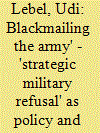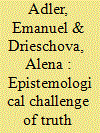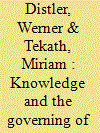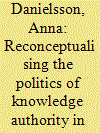|
|
|
Sort Order |
|
|
|
Items / Page
|
|
|
|
|
|
|
| Srl | Item |
| 1 |
ID:
131978


|
|
|
|
|
| Publication |
2014.
|
| Summary/Abstract |
The study shows how 'strategic military refusal' in Israel developed as a rational and institutional means to influence security policies. As opposed to the perspective that sees military refusal as a spontaneous individual act, the study illustrates how organizations operate to distribute military refusal in order to pressure decision-makers to change their military policies. This strategy has proven to be effective when the military is involved with groups that threaten it with refusal - which threatens the military's operational ability and its official and apolitical image. These include soldiers whose civilian authorities, rather than their military commanders, are perceived as an epistemic authority regarding security issues. The case study refers to the impact of strategic military refusal in Israel on security policies and the military doctrine. This was influenced by leftist groups, which, although they belonged to the parliamentary opposition, had dominant presence in the military ranks. Furthermore, the study examines the effect of the use of strategic military refusal on the model of military recruitment.
|
|
|
|
|
|
|
|
|
|
|
|
|
|
|
|
| 2 |
ID:
178562


|
|
|
|
|
| Summary/Abstract |
Truth-subversion practices, which populist leaders utilize for political domination, are a significant source of current pressure on the Liberal International Order (LIO). Truth-subversion practices include false speak (flagrant lying to subvert the concept of facts), double speak (intentional internal contradictions in speech to erode reason), and flooding (the emission of many messages into the public domain to create confusion). Aiming to destroy liberal truth ideals and practices, truth subversion weakens epistemological security; that is, the experience of orderliness and safety that results from people's and institutions’ shared understandings of their common-sense reality. It privileges baseless claims over fact-based opinions, thus creating communities of the like-minded between which communication becomes impossible. Truth subversion challenges the LIO's three key institutions: democracy, markets, and multilateralism. If truth-subversion practices prevail, societal polarization, inaccurate information, and emotional inflaming strain democracy and human rights protections. Markets that depend for their functioning on accurate information can falter, and multilateralism that relies on communication and reasoned consensus can decay. International relations (IR) scholarship has recognized knowledge production practices as a key feature underlying the LIO, but has not yet identified challenges to those practices as a threat for the LIO. We discuss what the discipline can do to alleviate its blind spots.
|
|
|
|
|
|
|
|
|
|
|
|
|
|
|
|
| 3 |
ID:
169780


|
|
|
|
|
| Summary/Abstract |
Traditionally, states were widely believed to be the only institutions claiming political authority. More recently, though, a number of authors have argued that we find various instances of political authority on the international level. We discuss three prominent proposals for conceptualizing international authority: Michael Barnett and Martha Finnemore’s account of the authority of international bureaucracies, David Lake’s extension of ‘relational’ authority to the international realm, and Michael Zürn’s recent proposal for ‘reflexive’ authority. These authors provide a nuanced and empirically rich picture of hitherto mostly overlooked forms of power in world politics. Yet, we argue that in doing so they lose sight of the distinctly normative character of political authority relations: these relations are built on the explicit normative claim to the right to rule. When such a claim is considered to be justified, authority relations generate content-independent reasons for compliance. Thus understood, authority serves an important function, namely, to facilitate broadly accepted and normatively justified forms of hierarchical coordination. From a normative perspective, therefore, broadening the concept of authority to include various other forms of power deprives us of a critical yardstick against which international organizations should be evaluated. Moreover, it creates a distorted picture of the scope of international authority. Our world is shaped by highly problematic power relations. Yet, in order to meet current challenges of global governance, we need more, not less authority. To illustrate this argument we examine the case of the World Bank, an organization that exercises considerable power while explicitly avoiding any claim to political authority.
|
|
|
|
|
|
|
|
|
|
|
|
|
|
|
|
| 4 |
ID:
190700


|
|
|
|
|
| Summary/Abstract |
While studies on the role of knowledge and expertise have seen a resurgence of interest in International Relations and in literature on peacebuilding and security governance, little is known how knowledge enters the governance routines after the initial establishment of peacebuilding operations. Taking the mandate decision-making process of MINUSMA and EUTM operations in Mali in the German parliament as case for our explorative study, we ask how knowledge has entered the parliamentary process and how various epistemic practices and epistemic agency shape this peacebuilding governance since 2013. Informed by an object-centred knowledge framework, we argue that the practices and types of agency involved mostly ‘lock-in’ the governing of robust peacebuilding in Mali in much broader foreign- and security policies routines. Epistemic practices are not primarily concerned with new impulses or critical analysis, but with rendering Mali governable as interventionary object. The epistemic authority of the government is dominant and we do not find much evidence that hegemonic knowledge is challenged. Intervening agents do extract certain knowledge via transnational channels from Mali, however, broader knowledge debates or the involvement of Malian agents are missing.
|
|
|
|
|
|
|
|
|
|
|
|
|
|
|
|
| 5 |
ID:
171790


|
|
|
|
|
| Summary/Abstract |
Peacebuilding debates increasingly revolve around questions about knowledge and expertise. Of particular interest is what (and whose) knowledge(s) ends up authoritative in interventions. This article addresses a problem in the literature on the epistemics and epistemic authority of peacebuilding interventions: the acknowledgement of but lacking attention to plural knowledges, the transgressive character of expertise, and knowledge struggles. It does this by discussing recent suggestions that peacebuilding epistemic authority can be fruitfully analysed as a Bourdieusian field. The article identifies a tension in Bourdieu's own thinking about fields, which has shaped some of these recent proposals. This tension, nevertheless, also enables a reconsideration of fields and struggles, and thereby an analysis that takes plurality and transgressiveness into account. By developing such an alternative conceptual position, the article sees peacebuilding epistemic authority as object- and struggle-bound; conditioned and dependent on dynamics that go beyond peacebuilding as a distinct field of practice. This position is illustrated in an analysis of the emergence and (temporary) establishment of epistemic authority in peacebuilding interventions on informal economies.
|
|
|
|
|
|
|
|
|
|
|
|
|
|
|
|
|
|
|
|
|